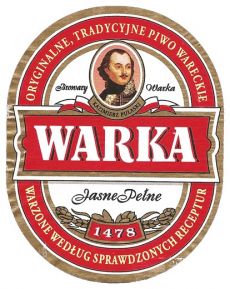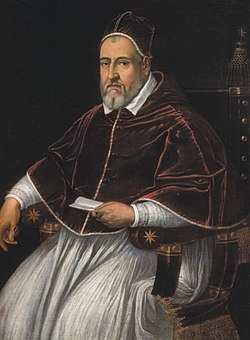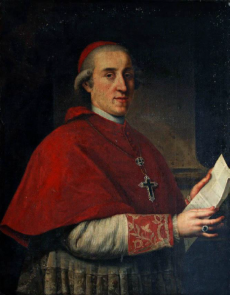Saint Piva of Warka

The town of Warka🔊, about 50 km south of Warsaw, is best known for its brewery and the beer that is made there. The modern brewery, opened in 1975, currently belongs to Grupa Żywiec, which is majority-owned by Heineken International. It brews a run-of-the-mill pale lager branded as Warka Jasne Pełne, as well as its stronger, maltier version called Warka Strong.
There were times, however, when the beer brewed in Warka was considered the best in the region of Masovia and even all across Poland. Warka’s beer-brewing traditions date back to the Middle Ages; even the town’s very name comes from Polish beer terminology and refers to the amount of wort brewed from a single batch of malt. The oldest known mention of the Warka brewery comes from 1478, the year when Duke Boleslav V of Masovia granted the town a monopoly for supplying beer to his own court and to the Warsaw town hall. Warsovians must have really liked the brew, as even two hundred years later Jakub Teodor Trembecki wrote in his poem (about how much alcohol is better than tobacco) that Warsaw lived on Warka beer. And at the beginning of the 19th century, Samuel Bogumił Linde, who compiled the first Polish-language dictionary, could provide only one example of how to use the adjective “wareckie” (“of Warka”) in a sentence: “dobre piwo wareckie”, “good Warka beer”.[1]
None of those writing about Warka beer can resist the temptation to cite the old anecdote about how this beverage saved the life of Pope Clement VIII. Let’s take the first example that comes to hand and see what Polish Wikipedia has to say on this topic:
| There is a legend about Warka beer and Papal Nuncio Ippolito Aldobrandini, who would later become Pope Clement VIII. During his stay in Poland he grew very fond the Warka beer. He claimed it “was excellent, piquant, reminiscent in colour and flavour of wine.” Back in Rome, he fell gravely ill. On his sickbed, he whispered, “… sancta Piva di Polonia… sancta Biera di Warka…” The clergymen present at his side, assuming he was talking about some obscure saint, proceeded to pray: “Sancta Piva, ora pro nobis” (“Saint Piva, pray for us”). When the sick pope heard it, he burst into laughter. As a result, the ulcer he was suffering from ruptured and Aldobrandini began to recover. | ||||
— Warka (piwo), in: Wikipedia, wolna encyklopedia, own translation
Original text:
|
Now, Piva may not mean much to you; unless, that is, you’ve ever had a beer in a Slavic country, in which case you know that “piva”, “pivo” or “piwo” is the word for “beer” in every Slavic language. It comes from the verb “to drink”, which shows that, for Slavs, beer is, by definition, the thing that you drink. Also notice the “saint’s” alternative name, Biera, which bears resemblance to “Bier”, the German word for “beer”.
Now back to the story. As is typical for Polish Wikipedia, the legend is quoted uncritically and without any citation of a reliable source. Oh, but it’s just a legend, so who cares if there are any historical sources to back it up? The legend, in the same or slightly modified wording, has spread across the Internet. You can find it, for example, on the official website of the town of Warka (where at least a source is cited – as Wikipedia). The anecdote predates the Internet, though, and can be found in printed sources as well. Tadeusz Żakiej, a musicologist who used to write about food under a double nom de plume as Maria Lemnis and Henryk Vitry, included the following version in his tale of Old Polish cuisine:

| It was also said that Pope Clement VIII, who was in Poland in 1588 as a legate of the Holy See, became a great aficionado of the exquisite beer made in Warka. When, as a pope, he fell gravely ill in Rome, he asked, delirious from fever, for Warka beer, calling out, “Piva di Varca”. The cardinals gathered around the pope’s bed, believing the sick man was invoking some saint for help, immediately began to pray, “Sancta Piva di Varca, ora pro nobis.” | ||||
— Maria Lemnis, Henryk Vitry: W staropolskiej kuchni i przy polskim stole, Warszawa: Wydawnictwo Interpress, 1979, p. 23, own translation
Original text:
|
As you can see, the author has neglected to inform us what illness the pope was suffering from or whether he came out of it alive. Is it because this final fragment seems least credible? After all (I’m not a doctor, but) “ruptured ulcer” sounds more like a serious complication than a prognostic of imminent recovery.
And if we’ve got two versions of the same legend, then maybe there are more? Let’s keep on looking. On the Virtual Warka website we can read the following:
| It’s worth recalling here a humorous anecdote about Papal Nuncio Gaetano, who was a great lover of Warka beer. When, back in Rome, he fell seriously ill with a throat ulcer, he whispered on his sickbed, “biera di Warka”. The clergymen present at his bed, thinking he was calling an obscure saint, began to pray, “Santa Biera di Warka, ora pro nobis” (“saint beer of Warka, pray for us”). Upon hearing this, the sick prelate burst into laughter and… recovered, as the ulcer he was suffering from finally ruptured. | ||||
— Andrzej Słomski: Zarys dziejów, in: Wirtualna Warka, own translation
Original text:
|
So we’ve got a ruptured ulcer again, but this time not in a pope, but in his envoy! The man in question is certainly Cardinal Enrico Caetani, whom Clement VIII sent as a legate to Poland and tasked him with convincing King Sigismund III to join a Habsburg coalition against the Ottoman Empire. The mission failed, by the way, as Maximilian III Habsburg was still claiming the Polish throne for himself after an inconclusive royal election.

So now we’ve got a riddle to solve: was it Clement or Caetani? Piva or Biera? To find out, we need to dig into somewhat older sources. Let’s see a source from 1888 and see if it gets any clearer.
| In 1596, Enrico Gaetano, an envoy of Pope Clement VIII, praised the beer of Warka in his diaries, claiming it was excellent, whitish, piquant, reminiscent in colour and flavour of wine. About the beer of Warka we once read the following anecdote: Nuncio Saluzzo grew very fond of Warka beer and upon leaving Poland he took with him considerable stock of that beer; but as everything in this world comes to an end, so did the nuncio’s barrels eventually run dry. It came to pass that the venerable prelate fell mortally ill, stifled by an enormous ulcer in his throat, and those gathered around him began to recite the litany for the dying. Meanwhile the sick was suffering from great thirst; in the middle of the litany, somewhere between Saints Gervase and Protase, the nuncio recalled his favourite refreshing beer, “Pivo di Varca, Pivo di Varca!” and sighed deeply twice. The priest reciting the prayer, thinking the nuncio remembered one more saint, responded piously, “Sancta Piva di Varca, ora pro nobis!” Hearing this, the nuncio burst cordially into laughter, the ulcer ruptured and with it ended the sickness. This is how the Polish beer of Warka saved a papal nuncio from death. | ||||
— Julian Kołaczkowski: Wiadomości tyczące się przemysłu i sztuki w dawnej Polsce, Kraków: Mikołaj Kamiński, 1888, p. 455–456, own translation
Original text:
|
Curiouser and curiouser! Firstly, the description of Warka beer as “excellent, whitish, piquant, reminiscent in flavor and color of wine” looks familiar, doesn’t it? Ah yes, it was Polish Wikipedia that attributed these words to Clement. Now it turns out it was Caetani’s opinion after all. And secondly, it was neither Clement nor Caetani who suffered from the throat ulcer, but Cardinal Ferdinando Maria Saluzzo, who lived a century later and served as the last papal nuncio to pre-partition Poland. So there, puzzle solved!

And besides, does it matter whether the anecdote tells of this or that prelate? What matters is that its every version praises the fine Polish beer of Warka, doesn’t it?
Well, then…
| The epithet “saint” or “holy” is used quite often by Italians, whether in anger or in admiration. It comes to them with ease to call an excellent wine vino santo; regarding this topic, it is said that a certain prelate who had been a nuncio in Brussels and who was fond of local beer, being consumed by a violent fever, cried out, “santa birra di Bruxelles”; and that his assistants, believing he had invoked a certain saint, responded earnestly, “ora pro nobis”. | ||||
— Louis-Antoine Caraccioli: La vie du pape Benoît XIV Prosper Lambertini, Paris: Rue et Hôtel Serpente, 1783, p. 307, own translation
Original text:
|
Could it be that some foreigner grew so fond of Warka beer’s legend that he began to tell the same story about some swill brewed in Brussels? You could think so, if it wasn’t for the next paragraph in the same source:
| This little story is reported by Monsignor Załuski, Bishop of Kyiv; puerile as it is, it proves how excessive Italians are in their expressions. | ||||
— ibid.
Original text:
|
So the Brussels version was told by a Pole! And not just any Pole, but Bishop Józef Andrzej Załuski, a famous 18th-century erudite and bookworm, co-founder of Poland’s first public library. He must have known what he was talking about, mustn’t he?
And still, if we go back to even older sources, we will see that our original assumption was correct; the Brussels variant was just a modification of an anecdote which was originally about Warka – even if foreigners sometimes misspelled it as Barca.
| The beer of Poland is very light and sweet; they call it Piva. That of Barca is the most esteemed. An Italian cardinal, who had been a papal nuncio in this kingdom, fell gravely ill in Rome; in the ardour of fever he remembered that beer, which he had once enjoyed with so much pleasure. And sighing with regret of not being able to sample again such a fine liquor, he called out suddenly with transport, “Ah! Piva di Barca!” Upon hearing this, his parents and servants, gathered around his bed, believed that he was invoking a foreign saint in whom he trusted. And so they all fell to their knees and said loudly, with devotion, raising their eyes to heaven, “Sancta Piva di Barca, ora pro nobis.” | ||||
— Le Glaneur françois, 6 (2), Paris: Pierre Prault, 1736, p. 64–65, own translation
Original text:
|
The oldest version of the legend I was able to find makes no mention of the alleged saint whatsoever. It talks only of la sainte bière de Varka, “the holy beer of Warka”. The following excerpt comes from François-Paulin Dalairac’s account of his travels in Poland, originally published in 1698.
| There are no Jews [in Warka], but there are many rich burghers who brew the best beer you can get in all of Poland (which doesn’t mean much, though). But, as far as this beer is concerned, I should not forget a story which the Poles tell about a cardinal who was once a nuncio in Poland; he had become so accustomed to the beer of Varka, that while dying, he called out for that beverage, as if it was to restore him back to health. He wanted it so bad, that he kept whispering, “bière de Varka, bière de Varka”. And his assistants, believing it to be some saint from a foreign land, whom the good man was invoking in agony, having just recited the litany of saints, added “la sainte bière de Varka”, as a new patron saint known only to the dying cardinal. | ||||
— François-Paulin Dalairac: Memoires du chevalier de Beaujeu, Amsterdam: les héritiers d’Antoine Schelte, 1700, p. 255–256, own translation
Original text:
|
The cardinal’s name does not appear in this account. It couldn’t have been Saluzzo, as he hadn’t even been born in 1700. Was it Caetani then? Perhaps, but the puzzle’s final solution keeps eluding us.
And maybe you know of some other source which could shed some more light on this subject? Or maybe you have your own guesses? Let me know in the comments. If you know other anecdotes related to Polish cuisine and wonder how much truth there is to them, then do let me know as well.
References
- ↑ Samuel Bogumił Linde: Słownik języka polskiego, vol. VI, Lwów: Zakład Narodowy im. Ossolińskich, 1860, p. 219
| ◀️ Previous | 📜 List of posts | Next ▶️ |
| ⏮️ First | 🎲 Random post | Latest ⏭️ |